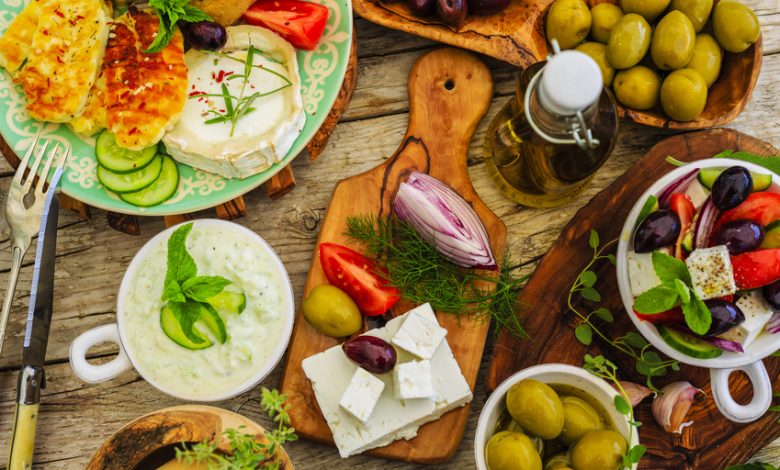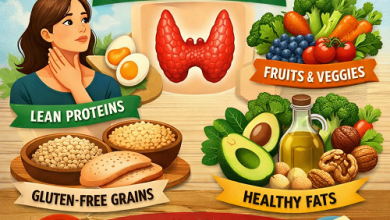8 Mediterranean Diet Foods Proven to Support a Longer, Healthier Life

The Mediterranean diet isn’t just another wellness trend—it’s one of the most extensively researched dietary patterns in the world, consistently linked to longer life expectancy, heart protection, reduced inflammation, better cognitive health, and lower risk of chronic diseases. Inspired by the eating habits of countries like Greece, Italy, and Spain, this diet prioritizes whole, nutrient-dense foods packed with healthy fats, antioxidants, fiber, and anti-inflammatory compounds.
What sets the Mediterranean diet apart is its focus on simple, flavorful food rather than restriction. It’s not about counting calories or cutting out food groups; it’s about nourishing the body with ingredients that support long-term health—and science backs it up.
8 Mediterranean Diet Foods
Below are eight Mediterranean staples scientifically linked to longevity and overall wellness, plus how to incorporate them into your meals.
1. Extra Virgin Olive Oil: The Heart-Protective Superfat
Extra virgin olive oil (EVOO) is the cornerstone of Mediterranean cuisine and a major reason this diet is associated with lower rates of cardiovascular disease. EVOO is rich in monounsaturated fats—especially oleic acid—which help lower LDL (“bad”) cholesterol while improving HDL (“good”) cholesterol.
It also contains powerful antioxidants like polyphenols that reduce inflammation, protect blood vessels, and support healthy aging.
Key Benefits:
- Reduces inflammation and oxidative stress
- Supports heart and brain health
- May reduce stroke risk
- Helps maintain healthy weight when replacing refined fats
How to Eat More:
Drizzle over salads, roasted vegetables, fish, or whole grains. Use as your primary cooking oil—but avoid high heat to preserve nutrients.
2. Fatty Fish: Omega-3s for Longevity and Brain Health
Mediterranean populations consume fatty fish such as sardines, salmon, anchovies, and mackerel several times per week. These fish are rich in omega-3 fatty acids, which help reduce triglycerides, improve arterial health, and strengthen brain function.
Research links higher omega-3 intake to lower mortality rates, lower inflammation, reduced risk of arrhythmia, and improved cognitive aging.
Top Mediterranean Choices:
- Sardines (cheap and nutrient-dense)
- Salmon
- Mackerel
- Anchovies
- Tuna
How to Eat More:
Grill with lemon and herbs, add canned sardines to salads, or blend anchovies into sauces for umami flavor.
3. Leafy Greens: Anti-Inflammatory & Nutrient Rich
Mediterranean meals frequently include leafy greens like spinach, arugula, chard, and kale—often cooked with olive oil and garlic. These greens provide vitamins A, C, K, magnesium, iron, and antioxidants that help reduce cellular damage and improve metabolic health.
Studies link high intake of leafy greens with:
- Lower heart disease risk
- Improved cognitive function
- Better digestion and gut microbiome diversity
- Reduced cancer risk
How to Eat More:
Add greens to soups, pasta, omelets, or sauté with olive oil as a side dish.
4. Legumes: The Longevity Protein Source
Beans, chickpeas, lentils, and peas are essential in Mediterranean cuisine—and one of the common foods found in global Blue Zones, regions with the world’s longest-living populations.
Legumes provide:
- Plant-based protein
- Soluble fiber that lowers cholesterol
- Slow-digesting carbohydrates that stabilize blood sugar
- Prebiotics that nourish gut bacteria
Popular Mediterranean Legume Dishes:
- Hummus (chickpeas)
- Lentil soup (Greek “Fakes”)
- Bean salads with herbs and olive oil
How to Eat More:
Swap meat for beans twice a week, add lentils to salads, or enjoy hummus with vegetables.
5. Nuts & Seeds: Small Foods, Big Impact on Longevity
Nuts are rich in healthy fats, magnesium, vitamin E, and antioxidants. Research shows they can significantly reduce heart disease risk and support healthy aging—even in small daily amounts.
Best Choices in the Mediterranean Diet:
- Walnuts (top source of omega-3 ALA)
- Almonds (vitamin E and heart health)
- Pistachios (supports blood sugar and vascular function)
- Sesame & flax seeds (hormonal and inflammatory support)
How to Eat More:
Enjoy a handful as a snack, sprinkle on yogurt or salads, or use tahini as a dressing base.
6. Whole Grains: Energy Without the Blood Sugar Crash
Unlike processed grains, Mediterranean whole grains retain beneficial fiber, minerals, and antioxidants. They help regulate digestion, improve insulin sensitivity, and stabilize energy levels—key factors in long-term metabolic health.
Common Mediterranean Grains:
- Whole wheat
- Barley
- Bulgur
- Farro
- Oats
- Brown rice
These grains support heart health and reduce risk of type 2 diabetes.
How to Eat More:
Replace white rice with barley or brown rice, use whole-grain pita, or make tabbouleh with bulgur and parsley.
7. Tomatoes & Colorful Vegetables: Antioxidants for Disease Prevention
Mediterranean diets are filled with colorful vegetables—especially tomatoes, peppers, zucchini, eggplant, onions, and herbs. Tomatoes are especially prized for lycopene, an antioxidant linked to lower risks of heart disease, prostate cancer, and inflammation.
Roasting tomatoes in olive oil boosts lycopene absorption, making Mediterranean cooking methods especially powerful.
How to Eat More:
Eat mixed vegetable platters, roasted dishes like ratatouille, and fresh Greek salads.
8. Berries & Fresh Fruit: Natural Sweetness With Anti-Aging Benefits
Instead of sugary desserts, Mediterranean cultures favor fresh fruit—especially berries, citrus, grapes, and figs.
These fruits provide:
- Polyphenols
- Vitamin C
- Fiber
- Antioxidants that protect cells from aging
Grapes, olives, and red wine also contain resveratrol, studied for anti-aging benefits and heart support when consumed in moderation.
How to Eat More:
Replace desserts with fruit, blend berries into smoothies, or pair figs with yogurt and nuts.
Why the Mediterranean Diet Promotes Longer Life
Beyond individual foods, the Mediterranean lifestyle plays a crucial role in longevity — including slow eating, social meals, walking, sunlight exposure, and reduced stress. It’s a holistic system that supports the mind, body, and community.
Key Science-Backed Outcomes:
- Lower cardiovascular disease rates
- Reduced metabolic syndrome
- Better gut health
- Improved brain aging and lower dementia risk
- Lower inflammation and oxidative damage
This approach focuses on eating real food, not following rigid rules—and that sustainability is why people can commit to it long-term.
Sample One-Day Mediterranean Meal Plan
| Meal | What to Eat |
| Breakfast | Greek yogurt with berries, honey, nuts, and chia |
| Lunch | Grilled sardines with lemon + side of leafy greens |
| Snack | A handful of almonds + green tea |
| Dinner | Olive oil roasted vegetables, chickpea salad, whole grain pita |
| Dessert | Fresh figs or oranges |
Final Thoughts
The Mediterranean diet is more than a cultural eating pattern—it’s a proven lifestyle that supports a longer, healthier life. By incorporating foods like olive oil, fatty fish, legumes, whole grains, greens, nuts, and fresh produce, you can nourish your heart, brain, and immune system naturally while enjoying delicious meals every day.




